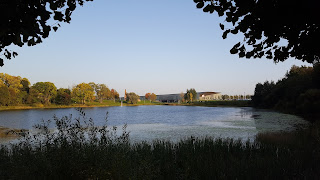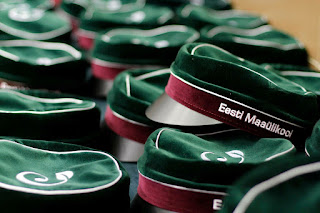Life in Estonia, part 2: Surviving the first week as a PhD student
How do you recognize a German doctoral student at an Estonian university? Well, fortunately, in my case, it is not the accent.
1. She wants to do a PhD (academic career) but considers going back into practice afterwards (How? Why?)
2. Whatever the weather, her footwear will be inappropriate
3. Smiles at strangers (obviously from Southern Germany, too!)
4. Has difficulties addressing professors by their first names from the beginning
5. If you ask a computer-related question, there are three possible answers: “No”, “Yes, but never used it” and “What is that?”
“So you think you might work as a farm veterinarian once you have that PhD title? That is very unlikely” says Tarmo, my supervisor.
“In Germany, that is actually how most people do it”, I reply, “but we’ll see, maybe I like being a scientist or teaching so much that I’ll stay on that career path.”
I proceed to installing the four applications on my work computer that I will need to communicate with him over the next four years and structure my work.
But let’s start from the beginning.
My first supervisor Toomas had emailed me: “No, eight o’clock is too early. Please come to my office at ten, then you can attend the statistics course for the PhD students, you have to do that anyway.”
So on Tuesday morning I knock at his door and have no idea what to expect from my first day.
“Allright, here is your key, this is your desk. I will organize the laptop for you.” He points to the desk by the window. Apparently, I am to share an office with the boss.
“We speak in Estonian, right? So you can practice?”
Not completely sure of it, I nod. “I will ask when I don’t understand something.”
“Good. The course is just across the hall.” He leads me through the door and I find a spot behind one of the computers. The lecturer enters and I have to blink and look again. He has green hair. And between that, seven thin, blond shoulder-length braids. “This is Tanel” says Toomas and leaves.
“Ah, so you are the one he had been hiding. Today is our third practical course, but I’m sure you will manage. Toomas’ PhD students are always good at statistics.”
I swallow hard. He then switches to English and I watch the other students opening a program on their computers that looks very scientific. I don’t understand one word and helplessly try to make as many notes as I can.
After two very exhausting hours of this course, my supervisor gives me a tour of the building, which I mostly already know from last time. But now, I am allowed to use the staff break room and I am introduced to everyone we meet in the hallways. It’s hard to decide which names I actually have to remember and who was just there by chance and will probably never work with me. Many people, like Tanel, seem to have heard about me already. “Ah, your new PhD student”, is Kaari’s greeting for example. She is just about to defend her thesis and I get to witness her earn the title Doctor of Philosophy the next day. Estonians don’t actually use the word “new” in this context, by the way, but instead say “fresh”. “Very fresh” Toomas confirms. “She got out of quarantine today.
Oh, this must be your German!” says Külli next to the coffee machine. “What is she investigating?” Proudly I make my way through the verbal monstrosity of my planned thesis title: Neonataalperioodi mõju piimalehmade tervisele ja toodangule. (More on that later, I’m sure)
„Actually,“ says Toomas „We have to change it from dairy cows to neonatal effects on health and performance of ruminants, because I have decided you’ll also do a study on sheep.“
Oh boy, another complicated word.
Finally, we reach the office of my second supervisor. “This is Tarmo. Tarmo, this is Marina.”
“Nice to meet you. So we are speaking Estonian?”
“Well, if people speak slowly and clearly enough, I can understand.”
“Use simple words” Toomas adds.
“So, what exactly is the plan? Are we going to collect samples soon?” I ask.
“Not anytime soon, actually. Settle in first, get used to everything” the two men say.
 |
| You could say: the mother of Tartu - river Emajõgi |
The next day it is already decided: my first scientific article is to be published in spring. Within the next three weeks, I will get enormous amounts of data to analyze. In the meantime, I should do the literature review and write the introduction. I break into sweat. That is soon. And a lot. And I don’t know anything about statistics. I have so much to learn! Apart from how to find articles relevant to my own research, how to write a paper and working with statistical programs, the first thing I learn is: you need to stop at some point. It is impossible to read all 300,000 articles ever published on the topic. It is also impossible to read all twenty of the most relevant that I found so far in one day. At some point you just have to take a break and continue the next day. But that is the life of the academics: the work is never done. For at the end of each paper must be an outlook: “Further it would be interesting to investigate how…” So technically, I could work for the next four years without ever taking a break to sleep, and still not be done.
Now I have my work laptop, home internet, and furniture. That is brought by three movers, and since we’re in Tartu, of course I already know one of them though mutual friends. As it is still really warm, I leave my Gore-Tex shoes at home the next day – and of course it starts raining. So I get back to the waterproof shoes, only to find myself in 25 degrees Celsius on my way home from work. I need an entire week to understand the weather. But then I can simply enjoy living in the picturesque part of Tartu that is called Karlova, the chestnut trees before my window and also the colorful and sunny Estonian fall. Fall in this country is the most beautiful thing I can imagine.
 |
| Raadimõisa park - view of the National Museum |
Every day, I have to force myself to stop at some point, shut down the computer and postpone the next papers to the next day. But I do take the statistics textbook home for the weekend. “A PhD is no walk in the park”, says Tarmo. That much is clear. But I have survived vet school. The next four to five years will be exhausting, but I’ll manage somehow. I am surrounded by lots of academics, and all of them are still alive.






Wer professionelle Unterstutzung sucht, achtet besonders auf Qualitat und Erfahrung. uber ghostwriter-bachelorarbeiten.at erhalt man genau diese Mischung aus Zuverlassigkeit und wissenschaftlicher Kompetenz. Das ist ideal, wenn mehrere Abgaben gleichzeitig anstehen.
AntwortenLöschen